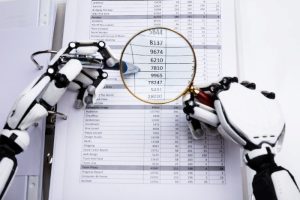Why Automation is Imperative for Accountants to Survive.
As the world of accounting evolves, automation of accounting records is quickly becoming an essential tool for any firm looking to remain competitive. As more firms are turning to technology for quicker and more accurate data entry, those who don’t may find themselves struggling against the current. It’s time now more than ever to embrace automation in your accounting system in order to stay afloat in this rapidly changing field. In this blog post we’ll explore why automating your accounting processes is so important and how it can help you better serve your clients and drive success.
What is Automation and Why is it Necessary for Accounting Firms to Keep up in the Industry
Automation has been revolutionizing the accounting industry in recent years, making it a must-have for all accounting firms. The use of automated accounting software and tools has resulted in a more efficient and streamlined work process for accountants, allowing them to focus on more strategic, value-adding tasks. The saved time can be allocated to activities such as creating financial projections and analyzing data to identify trends, supporting businesses in making informed decisions. The accuracy and consistency of automated processes also help reduce errors, giving clients more confidence and trust in their accountants. By embracing automation, accountants can improve their productivity, increase client satisfaction, and ultimately boost their bottom line. Hence, it is crucial for accounting firms to adopt automation to stay competitive in the ever-evolving world of technology.
Benefits of Automation for Accountants
Automation has been revolutionizing the accounting industry in recent years, making it a must-have for all accounting firms. The use of automated accounting software and tools has resulted in a more efficient and streamlined work process for accountants, allowing them to focus on more strategic, value-adding tasks. The saved time can be allocated to activities such as creating financial projections and analyzing data to identify trends, supporting businesses in making informed decisions. The accuracy and consistency of automated processes also help reduce errors, giving clients more confidence and trust in their accountants. By embracing automation, accountants can improve their productivity, increase client satisfaction, and ultimately boost their bottom line. Hence, it is crucial for accounting firms to adopt automation to stay competitive in the ever-evolving world of technology.
How Automation Helps Improve Accuracy, Speed and Efficiency
In the fast-paced business world, accounting processes need to be as efficient as possible. One solution to this challenge is the implementation of technology-based automation in finance processes. There are many technologies that businesses can use to automate their accounting tasks. For example, Optical Character Recognition (OCR) software can read invoices and receipts and convert them into digital formats that can be quickly processed by accounting systems. Robotic Process Automation (RPA) is another technology that can help automate repetitive manual tasks, reducing human error and saving time. Artificial Intelligence (AI) can also assist with more complex tasks in automated accounting systems, such as forecasting
What Technologies Can Be Used to Automate Processes in Accounting
In the fast-paced business world, accounting processes need to be as efficient as possible. One solution to this challenge is the implementation of technology-based automation in finance processes. There are many technologies that businesses can use to automate their accounting tasks. For example, Optical Character Recognition (OCR) software can read invoices and receipts and convert them into digital formats that can be quickly processed by accounting systems. Robotic Process Automation (RPA) is another technology that can help automate repetitive manual tasks, reducing human error and saving time. Artificial Intelligence (AI) can also assist with more complex tasks in automated accounting systems, such as forecasting and data analysis. By embracing these cutting-edge technologies, businesses can streamline their accounting processes and gain a competitive edge in their industries.
Challenges and Best Practices for Implementing Automation in Accounting
As automation becomes increasingly prevalent in the accounting industry, it is important to consider both the challenges and best practices for implementation of automated accounting system. One challenge is ensuring data accuracy throughout the automation process. It is crucial to have systems in place to catch errors and address them promptly. Another challenge is maintaining a skilled workforce that can handle the technology. One best practice is to involve employees in the implementation process and provide ongoing training and support. It is also important to prioritize which tasks to automate based on their potential impact on efficiency and accuracy of business operations. By carefully considering these factors, organizations can successfully implement automation in their accounting practices and reap the benefits of streamlined processes and improved accuracy.
Benefits of Automated Bookkeeping and Reporting
Automated bookkeeping and financial reporting are game-changers for businesses of all sizes. By using software tools and technology, companies can manage their financial data accurately and efficiently. For small businesses, in particular, the benefits of accounting automation are enormous. They no longer need to rely on manual bookkeeping, which takes up precious time and can be prone to errors. Instead, an automated system allows businesses to focus on growing their operations, while financial data is managed seamlessly in the background. Furthermore, there’s no need to worry about the accuracy of reports or calculations since everything is done automatically. With such advanced capabilities, automated bookkeeping and reporting can help businesses stay on top of their finances, make better-informed decisions, and ultimately thrive.
Analyzing how AI is transforming accounting
As technology continues to evolve and shape various industries, the field of accounting is no exception. Artificial Intelligence (AI) is transforming the way accountants work, providing a range of benefits that were once impossible to achieve. AI is being used to automate mundane tasks in accounting process, such accounting jobs such as data entry and processing, freeing up time for accountants to focus on more valuable tasks. With AI’s advanced data analytics capabilities, accountants can now uncover insights that were previously hidden, allowing them to make more informed decisions. As AI continues to advance, it’s clear that its impact on the field of accounting will only continue to grow, making it an exciting time to be a technology expert in this industry.
Risks to consider when using automation in accounting
In today’s digital age, the use of automation in accounting is becoming increasingly popular, and for good reason. It streamlines processes, minimizes errors, and frees up time for more important tasks. However, it is important to consider the risks that come with this new technology. One of the biggest risks is the potential for hacking or data breaches, which can compromise sensitive financial information. Another risk is the loss of jobs for individuals who were previously responsible for manual accounting tasks. Additionally, automated accounting software can experience glitches or bugs, resulting in incorrect calculations or data inaccuracies. While automation can undoubtedly enhance efficiency and productivity in accounting operations, it is crucial to assess and mitigate these potential risks to ensure the security and accuracy of financial information.
How using automation can drive your bottom line
Accounting automation can have a significant impact on a business’ bottom line. Automated bookkeeping and reporting eliminates the need for manual data entry and processing, saving time and money. AI-powered analytics tools can also uncover hidden insights in financial data, bank accounts, and statements, helping businesses make more informed decisions that will have a positive effect on their bottom line.
Automated processes also minimize the risk of human errors, resulting in fewer costly mistakes and improved accuracy. All of these benefits can significantly boost a business’ profits and cash flow, making accounting and financial automation such an invaluable tool for businesses of any size.
Overall, it is clear that automation has the potential to revolutionize the computerized accounting software industry, providing numerous benefits and management software that can help.
Using automation allows accounting teams to provide their clients with more perceived value.
Automation allows accounting professionals to provide their clients with more perceived value through increased accuracy, productivity, and efficiency. By automating transactional accounting tasks such as data entry and processing, financial information is handled more quickly and with fewer errors—allowing for the faster completion of client reports. AI-powered analytics tools can also uncover insights in financial data and create reports that would otherwise remain hidden, providing clients with a more comprehensive understanding of their financial statements. Ultimately, automation can help an accounting team and operations deliver better services while freeing up time to focus on more valuable tasks, increasing client satisfaction and improving their bottom line.
Automation will continue to evolve
Automation will continue to change the accounting profession and revolutionize finance departments. Financial professionals will rely on how proficient machines will eliminate time consuming tasks, create more reliable financial records, and provide more detailed financial reports. This will drive operational efficiency for accounting firms and through automated tools accounting firms will be able to further improve accounting workflows, automate invoicing, and provide improved tax planning.
Automation in accounting offers a wealth of opportunities to streamline processes, automate bookkeeping and reporting, and leverage machine learning and AI for smarter data analysis. While there are some risks to consider, the potential rewards in terms of efficiency, value-add, and money saved are too great to ignore. To make the best use of automation tools in accounting, organizations must take into account the particular risks and benefits associated with their own operation in order to craft a tailored approach to software solutions that meets their needs. The rewards of digital transformation in accounting can truly help businesses unlock immense advantages and potential for success.
How can we help? Contact IT 4 My Business today set up a FREE consultation or a service call.610-792-5660










